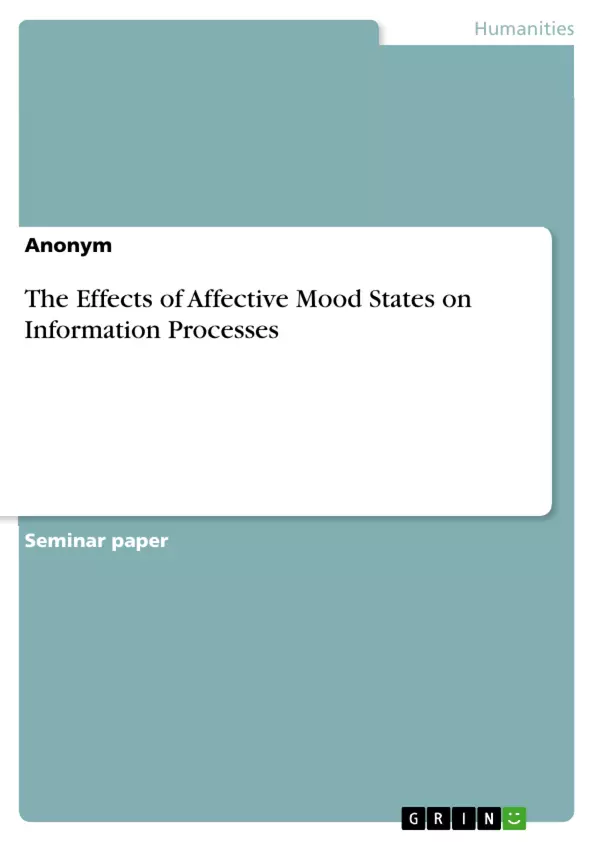In the following, I am going to analyse the effects of affective mood states on information processes. I will start by defining emotions and then taking mood into account as an essential aspect for the philosophy of mind. I will thereby explain the term "mood congruence" and demonstrate the mood-congruency effects on information processing – specifically positive- and negative moods effect. Next, the focus will lie on how an epistemology of mood and background / existential feelings could look like. In order to elaborate on my idea, I am going to examine Matthew Ratcliffe’s epistemological approach to background feelings. Subsequently, I will address the gap between epistemology of emotions and psychology which, ultimately, is responsible for a lack of understanding of the connection between affective mood states and thoughts.
Inhaltsverzeichnis (Table of Contents)
- Introduction
- Definition of emotions
- Mood congruence & mood-congruency effect
- Mood-congruent effects on information processing
- Positive moods effects on information processing
- Negative moods effect on information processing
- Epistemology of mood and background / existential feelings
- Ratcliffe's epistemological approach to background / existential feelings
- The gap between psychology and epistemology
Zielsetzung und Themenschwerpunkte (Objectives and Key Themes)
This paper aims to analyze the effects of affective mood states on information processing, bridging the gap between philosophical and psychological perspectives on emotions. It explores how mood influences cognitive processes such as attention, learning, and memory, arguing for the necessity of integrating philosophical and psychological frameworks for a comprehensive understanding of the epistemology of emotions.
- The definition and nature of emotions and moods.
- The concept of mood congruence and its effects on information processing.
- The impact of positive and negative moods on cognitive functions.
- An epistemological approach to mood and background feelings.
- The relationship between psychology and epistemology in understanding emotions.
Zusammenfassung der Kapitel (Chapter Summaries)
Introduction: This chapter introduces the topic of the relationship between affective mood states and thoughts, highlighting the need for an integrated philosophical and psychological approach to understanding the epistemology of emotions. It outlines the paper's structure and objectives.
Definition of emotions: This section explores various definitions of emotions, drawing on perspectives from philosophers like Brady, Nussbaum, and Tappolet, as well as psychological viewpoints. It emphasizes the multifaceted nature of emotions and the importance of considering factors like mental health and mood in their definition.
Mood congruence & mood-congruency effect: This chapter defines mood and explains the concept of mood congruence. It discusses the mood-congruency effect, illustrating how mood influences information processing and recall.
Mood-congruent effects on information processing: This section examines the impact of both positive and negative moods on information processing, detailing how mood affects cognitive functions like attention, learning, and memory.
Schlüsselwörter (Keywords)
Affective mood states, emotions, mood congruence, mood-congruency effect, information processing, epistemology of emotions, psychology, philosophy of mind, background feelings, cognitive processes, memory, learning, attention.
- Quote paper
- Anonym (Author), 2019, The Effects of Affective Mood States on Information Processes, Munich, GRIN Verlag, https://www.grin.com/document/1515271



